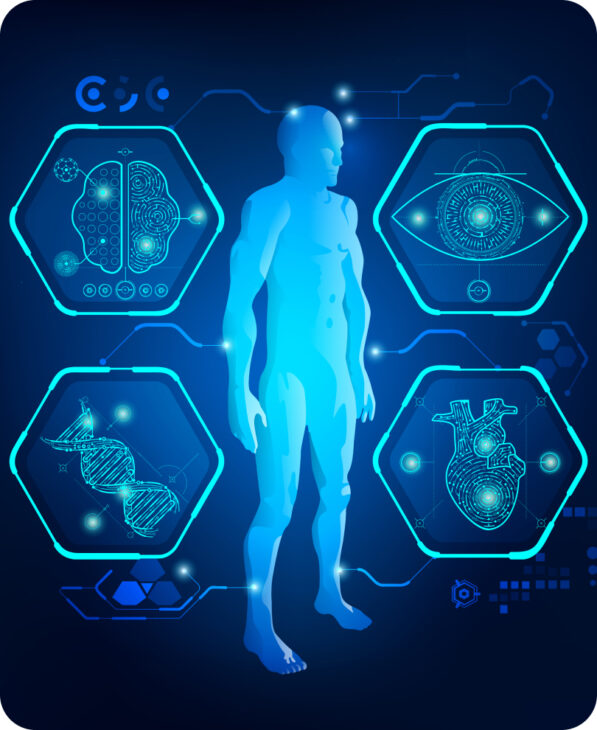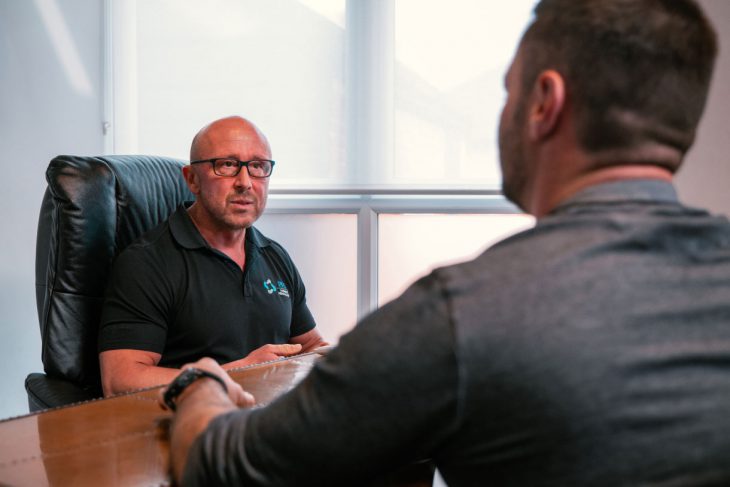What is Testosterone?:
Testosterone is a hormone, a chemical messenger that influences the function and development of certain target organs. It has traditionally been thought of as the male-sex hormone, however its significance in ongoing health has been under-recognised by traditional medicine.
Testosterone has an important role in many aspects of your health, including:
- Mental well-being & cognitive function
- Energy
- Libido
- Sexual function & fertility
- Muscular development
- Cardiovascular health
- Bone strength
- Weight control
It’s continued abuse as a Performance Enhancing Drug has had a negative impact on its legitimate use in correcting a medical deficiency. The primary role of testosterone is to help facilitate growth and repair within the body, as your cells are constantly replacing and repairing themselves. Testosterone is therefore considered to be an anabolic hormone, its role within the body has far more significance than simply muscle growth.
Testosterone Deficiency & Testosterone Replacement Therapy:
Testosterone Deficiency is a recognised medical condition. We use the latest British Society for Sexual Medicine guidelines when diagnosing and treating men with low testosterone. It is important to have a thorough diagnostic blood work up, to not only identify a deficiency, but to also look for potentially reversible causes and exclude possible contraindications.
The aim of Testosterone Replacement Therapy (TRT) is to correct the deficiency. This has traditionally meant administering testosterone monotherapy to help restore testosterone levels to within normal physiological parameters for long term physical and psychological health. From a qualitative perspective, the aim of TRT is to reverse the negative symptoms associated with having a deficiency. From a quantitative perspective, the aim is to normalise physical parameters to help the body maintain homeostasis and well-being.
TRT is a medical therapy used to restore male androgen levels to within normal physiological parameters for long term physical and psychological health. It should be considered a lifelong therapy and only started after addressing possible reversible causes and looking to correct possible aggravating issues in lifestyle, nutrition and physical exercise that might be having a negative impact on your ongoing health.
Traditionally, the focus of testosterone replacement has been to just administer testosterone. However, exogenous testosterone suppresses the brains signalling of Lutenising Hormone and Follicle Stimulating Hormone down to the testes. This can have a negative impact on fertility, testicular size and the other roles of Lutenising Hormone within the body. Lutenising Hormone is found in numerous organs, most noticeably the brain.
Human Chorionic Gonadotropin (hCG) mimics Lutenising Hormone which is suppressed by administering exogenous testosterone. HCG can therefore help retain fertility whilst on TRT, as well as help preserve testicular size and function. In our clinical opinion, male hormone replacement therapy should include both testosterone and hCG.
Homeostasis involves numerous physiological mechanisms that need to act symbiotically to help the body maintain a constant internal environment despite external changes. The body has periods when it is primarily anabolic and conversely periods when it is catabolic. Normalisation of testosterone is integral to helping the body achieve this balanced state.
Gold Standard TRT – Testosterone Cypionate or Enanthate & HCG:
Your TRT protocol will be specifically tailored to meet your individual requirements based on your genetics, physiology and utilisation. The aim of TRT is normalisation and understanding that your body requires stability in order to function properly. There is diurnal variation in your testosterone levels because of the diurnal need for you to be predominantly anabolic and catabolic at certain times of the day. The aim of TRT is to attempt to mimic your own natural production as closely as possible to help the ongoing physiological processes that are occurring within your body.
We utilise Testosterone Cypionate or Enanthate as our gold standard testosterone esters. Their half-lives are relatively short, meaning potential negative side effects can typically be managed by simple dose adjustment, but the half-life’s are long enough to ensure stability. We do have patients on other types of testosterone treatment, but these are determined on clinical need.
Our preferred route of administration is subcutaneous injections, they are less painful than shallow intramuscular injections, with less long-term scarring, and lead to slower absorption which minimises potential side effects as a result of excess oestrogen. Several of our patients are still self-administering shallow intramuscular injections, but this is dependent on the choice of ester and clinical need.
Microdosing TRT:
We firmly believe that Microdosing TRT is the future of Testosterone Replacement Therapy.
Microdosing is using small volumes of a drug, in this case testosterone and hCG, to achieve more stable levels. It is both safe and effective. You do not have to have an in-depth understanding of pharmacokinetics to understand why NHS recommendations are not optimal. The rationale for micro-dosing is using the minimum effective dose in the correct manner to achieve stable male androgen levels. The aim is to mimic your natural physiological levels, for long term physical and psychological well-being.
It is important to understand that all hormones are dependent, whether that be direct or indirect relationship, and that physiology tries to maintain a stable internal state despite external changes. We are seeking normalisation, not supra-physiological levels, as they will ultimately have a negative impact on your health. Your DNA wants you to be normal.
Negative health consequences of supraphysiological levels include:
- Decline in mental well-being
- Raised blood pressure & increased cardiac load
- Raised haematocrit
- Abnormal lipid status
- Worsening lower urinary tract symptoms
- Link with prostate cancer
- Gynaecomastia





